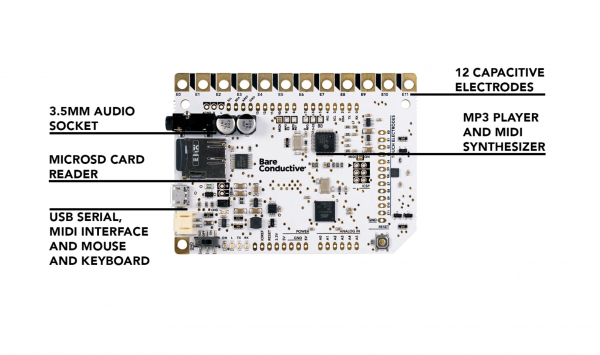Integrating Sound in Your Projects
When one wants to add sound to their electronics project, there are a lot of ways to do it. At the Interaction Station, we offer a couple of simple ways to work with sound in your interactive project.
Interactive sound control methods:
- Touch Board: The Touch Board is a microcontroller (like Arduino for instance), with already build in capacitive sensors (also known as touch sensors) as well as an audio socket. This set up makes the board really convenient for projects having interaction through touch (or proximity) and a sound output.
- DFPlayer: The DFPlayer is a cheap and compact way to add sound to your project. It has a build in stereo amp (3W per channel) which can drive small speakers. If you use it with an Arduino Nano, you have a very compact module that can play sound which can store up to 32GB of data on a microSD card. Nice for wearables or mobile set-ups. This can be used with various Arduino's, ESP's and other microcontrollers. It also only uses 2 digital pins.
DFPlayer mini
- Adafruit "Music Maker" MP3 Shield: The Adafruit "Music Maker" is a very easy to use shield made by Adafruit. With it, you can play audio files or be used to create a MIDI controller. The version we have at the Interaction Station, does however, not have amplification, so you cannot directly drive speakers with it. It is specifically designed for the Arduino UNO, Leonardo and MEGA. To use this shield with pressure plates or buttons, follow this tutorial: Playing sound (with the MP3 shield) & pressure plates
Adafruit "Music Maker" MP3 Shield
- Adafruit VS1053 Codec + MicroSD Breakout - MP3/WAV/MIDI/OGG Play + Record - v4: This breakout board is designed to be used on a breadboard. It can play various audio files and be used to record audio. You can do all sorts of stuff with the audio as well such as adjusting bass, treble, and volume digitally. There is also 8 GPIO pins that can be used for stuff like lighting up small LEDs or reading buttons.
Adafruit VS1053 Codec + MicroSD Breakout



